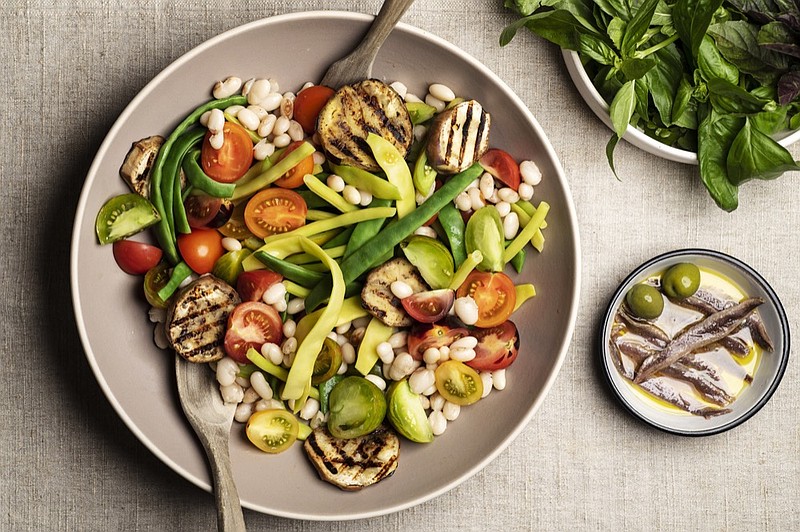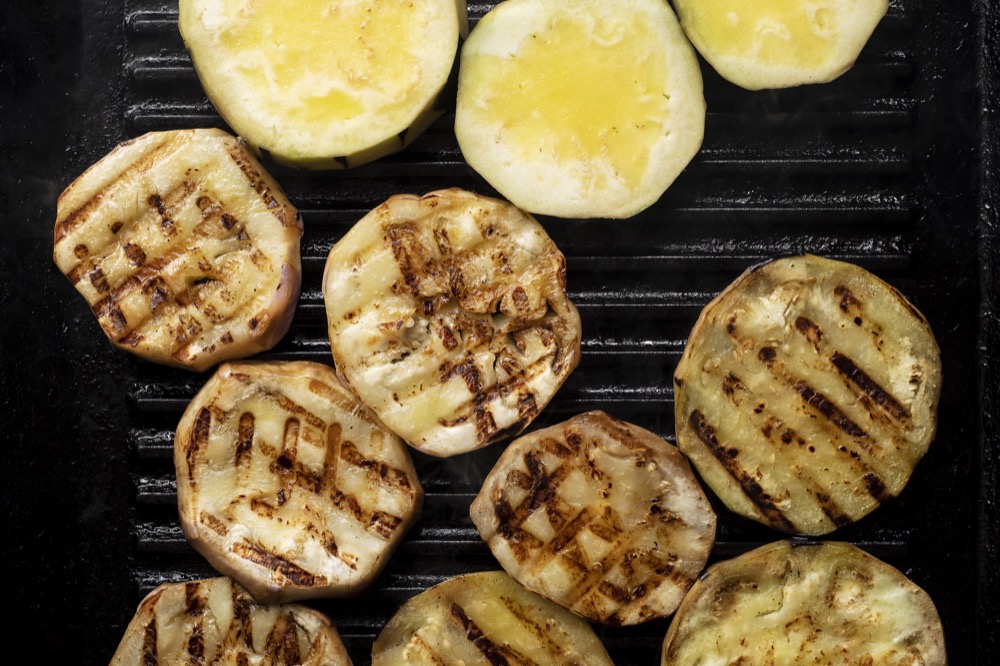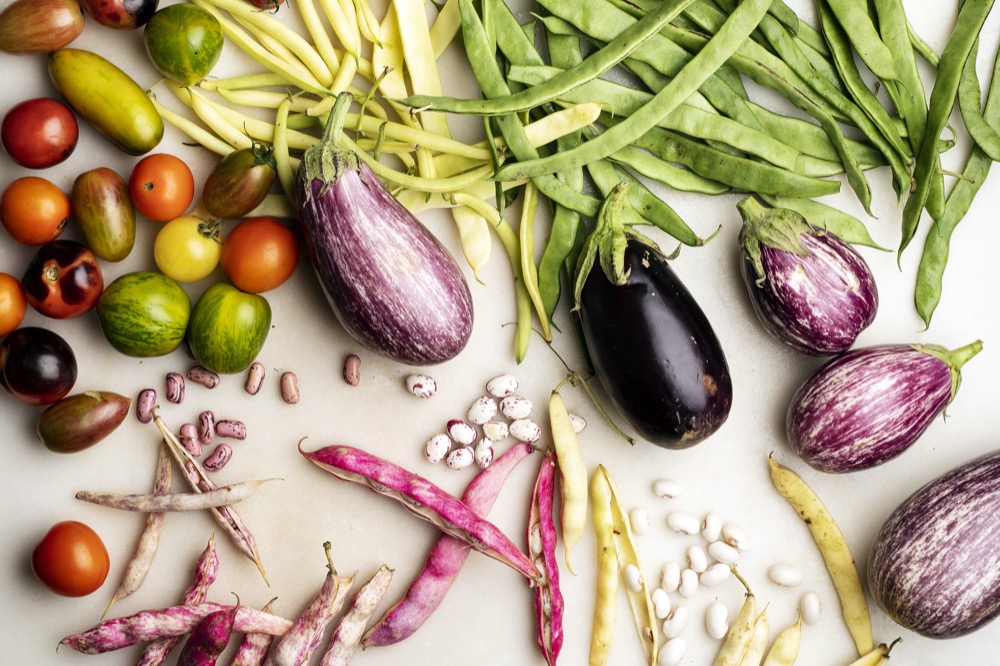Because my summer dining habits rely heavily on fresh vegetables, I'm jealous of anyone with a garden. To step outside in the evening and pick a head of lettuce or pluck a few sprigs of basil is my idea of heaven.
Of course, I'm aware that home gardening is hard work; that bad weather can thwart a grower's efforts in a matter of minutes; that it's impossible to keep up with the zucchini and the beans; and that invasions of vegetable-chomping insects are inevitable. Still each year, after the thaw, I plant some herbs in pots and wish I had a garden to tend.
There's a thrill watching and waiting as a vegetable matures to ripeness. But the truth is, the real rush is in the taste: Freshly picked produce has an incomparable, palpable sweetness and fullness of flavor that are fleeting.
Thank goodness for farmers markets. That's where I do my vegetable picking in the city. (When I visit friends in the country, I'm happy to assist with foraging and harvesting.)
The markets are currently overflowing with summer bounty. There's a colorful, crazy-quilt aspect to it all, with stand after stand packed with scads of stone fruit and berries, piles of corn, tomatoes, eggplants and melons, and bushels of beans of different sizes and shapes.
Beans are a personal favorite, whether they are skinny haricots verts or flat Romano beans, sometimes called flat beans or pole beans. Most of all, I love the fresh summer shelling beans. Look for white coco beans in yellow pods, speckled cranberry beans in scarlet pods, fresh black-eyed peas or lima beans. Once shucked, these beans cook in about 30 minutes and have the most incredible texture, soft and creamy. (But make sure to buy a good amount: It takes at least 2 pounds to get a few cups shucked.)
Though many of the market's offerings are perfect for salad in their raw state, my goal was to make a simple cooked vegetable salad, seasoned with nothing more than salt, pepper and a drizzle of olive oil, to demonstrate that freshly picked vegetables need hardly any adornment, and to enjoy that fact.
I cooked fresh shelling beans and fat, flat Romano beans. I grilled some sliced eggplant. But the beautiful many-hued tomatoes I did not cook. Tossed together at the last minute and served at room temperature, this salad was, for me, just about perfect.
For those who would like a bit more aggressive seasoning, there's the option of dressing the salad with oil and vinegar and garnishing with some meaty anchovy fillets, or of dressing the salad with a garlicky anchovy vinaigrette.
To make it more of a meal, you could spoon the salad over large spicy arugula leaves; halved nine-minute eggs would be another nice accompaniment. But for market-fresh - or garden-fresh - vegetables like these, keep it simple and try them first with minimal seasoning.
Summer Vegetable Salad
Yield: 4 to 6 servings
Time: 1 hour
3 cups fresh coco, cranberry beans or other fresh shelling beans, from about 2 pounds in the pod
Extra-virgin olive oil
Kosher salt and black pepper
1 sprig thyme or rosemary, or 1 bay leaf
1 pound Romano beans (sometimes called flat beans or runner beans), topped and tailed
2 medium eggplants (about 1 pound), peeled, if desired
1 1/2 pounds medium and cherry tomatoes, preferably of different colors, quartered, cut into wedges, or halved, as necessary
Anchovy fillets or anchovy vinaigrette, optional
Basil leaves, for garnish
Put the shelling beans in a pot with water just to cover. Add 1 tablespoon olive oil, a good pinch of salt and herb sprig. Bring to a boil, then reduce to a gentle simmer for about 30 minutes, until beans are tender. Remove from heat, but let beans remain in their broth to stay moist.
Meanwhile, bring a pot of well-salted water to a boil. Add the Romano beans, and cook for 2 to 3 minutes, leaving them slightly al dente. Drain, and spread the beans out on a large plate to cool.
Cut eggplant crosswise into 1/2-inch slices. Paint each slice lightly with olive oil on both sides, then season with salt and pepper on both sides.
On a hot grill, under a hot broiler, or in a dry cast-iron skillet over medium-high heat, cook eggplant slices, in batches, for about 3 minutes per side until softened and lightly browned. With a spatula, transfer slices to a platter in one layer to cool.
To assemble the salad, drain the shelling beans (save broth for another use), discarding herb sprig and place in a wide, deep platter or salad bowl. Season lightly with salt and pepper and a tablespoon of olive oil.
Season the Romano beans and tomatoes lightly with salt and pepper and a tablespoon of olive oil.
Top shelling beans with Romano beans and tomatoes, and toss briefly. Tuck grilled eggplant slices here and there. Garnish with basil leaves and anchovy fillets, if using. Drizzle with vinaigrette, if using. Serve at room temperature.
Tip: For an easy anchovy vinaigrette, whisk together 1 minced garlic clove, 1 teaspoon chopped anchovy fillets, 2 teaspoons Dijon mustard, 2 tablespoons lemon juice or red-wine vinegar and 3 tablespoons extra-virgin olive oil. Season with salt and pepper.


